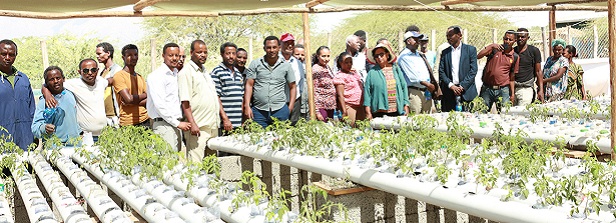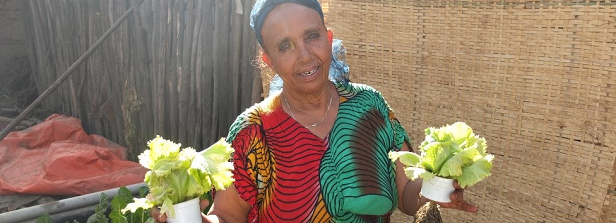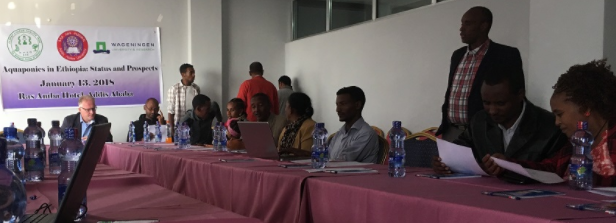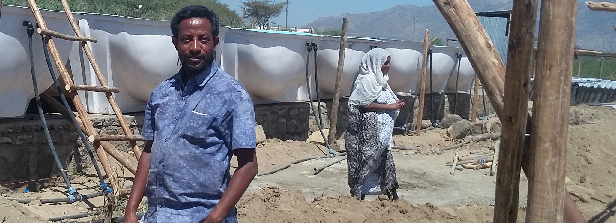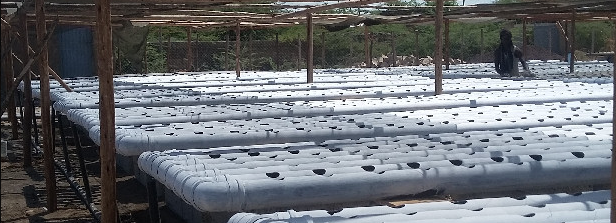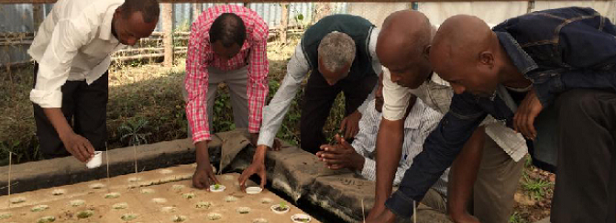Sustainable integrated fish-vegetable production in Ethiopia
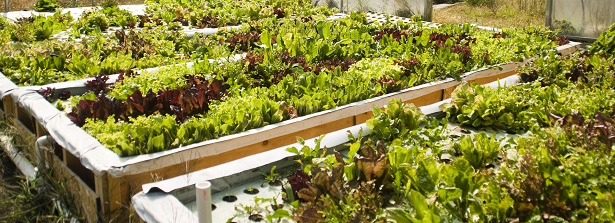
Duration: March 01, 2015 – January 31, 2018. This project has been finalized.
Project information
Aim: To increase nutrition security of rural households in Ethiopia the project aims to increase the production of fish and vegetables while saving scarce natural resources, through the transfer of prototype aquaponics systems to 24 rural households in Ethiopia.
Objective: To provide households with an affordable and profitable aquaponics system to generate protein and micronutrient rich food and income to improve their food security situation while being efficient with scarce resources such as water and nutrients. A second objective is to prepare the sustainability of existing and dissemination of new aquaponics systems through the development of a business model that can support establishment, technical assistance, input supply and marketing of products of such a well-performing aquaponics system.
Method: Action research on technology, value chains and business models is conducted via a mixture of research methods. A continuous and systematic monitoring is executed of inputs and outputs in nutrients, water, energy, labour, cash and fish and vegetable biomass to assess the performance of the systems that are established. A baseline survey is done with households just before installation of aquaponics units, assessing current food and nutrition and income positions of households and the survey will be repeated at the end of the project. Marketing information is gathered and potential business partners are interviewed aiming to engage them as partners in the business model.
Country: Ethiopia.
Dutch policy goals: Inclusive business models for food security
Progress reports
Year 1: Eight aquaponics systems have been built for women in Shewa Robit and for poor households in Hawassa. Thirty will be built in Metehara for unemployed. All beneficiaries and staff of support centres have been trained and beneficiaries have signed contracts. A study on food systems in Ethiopia has confirmed that fish and vegetables are lacking from Ethiopian diets. A market study in Hawassa has revealed interests in fish and vegetables in local fresh markets, restaurants and Dutch companies addressing further away markets. A manual has been made on diseases in aquaponics systems. The project received about 100 visitors.
Year 2: In Shewa Robit, Hawassa and Metehara the aquaponics systems are technically running. Three business models are developing. In Metehare the government pays unemployed youths a modest salary to take care of the system and organises collective sales for fixed prices. The system has its own hatchery for small fish and nursery for vegetable seedlings. Fish feed supply requires attention. In Shewa Robit producers sell individually on a spot market. A lady entrepreneur has started producing fish feed and is ready to become retailer for vegetable seeds. Provision of small fish needs attention. In Hawassa fish feed is provided by Addis Ababa university, small fish by a fisheries research centre. A Dutch aquaculture firm is establishing in the region which will affect market opportunities. Collective sales to niche market of hotels/restaurants or an outgrower scheme with the Dutch firm are options to be explored. Economic performance of all systems is monitored.
Final report
Summary of the results: In Shewa Robit, Hawassa and Metehare the aquaponics systems are technically running and economically viable. Three business models are developed. In Metehare the government pays unemployed youths to manage the system. They share revenues made in collective sales for fixed prices. The system has its own hatchery for small fish and nursery for seedlings. In Shewa Robit female producers sell individually on a spot markets. One woman has started producing fish feed according to a formula based on cheaper local ingredients, developed by the project. Debre Berhan University will be centre of expertise, support producers and provide fingerlings. In Hawassa the fish feed is provided by Addis Ababe University. The fisheries research centre of Southern Nations Nationalities and Peoples Regional State will serve as expertise centre and provide fingerlings. Future collaboration with a Dutch aquaculture firm is an option. In Ethiopia aquaponics has provided rural and peri-urban populations with access to fish and vegetables.
Dissemination materials are available on a website in two local languages and English, consisting of manuals, pictures, research reports, short instruction videos and contacts of aquaponics experts. Ethiopian ministry of livestock and fisheries has embraced the practices. TGS has expanded aquaponics business in Egypt, Curacao, Kenya.

